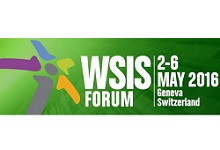How the internet enables sustainable development: Incorporating data-driven policies to measure impact
5 May 2016 15:00h
Event report
[Read more session reports and live updates from the WSIS Forum 2016.]
The thematic workshop brought together speakers from various organisations to share their perspectives on how the Internet enables sustainable development and to discuss best practices and lessons-learned.
Mr Paul Escheberia (Internet Society) opened the floor by highlighting the role of ICT in achieving sustainable development. He reminded us that this goal cannot be achieved without bringing services to deprived regions through remote services. Escheberia emphasised the need to involve ICT in policy-making to address the digital challenges ahead.
Ms Phillippa Biggs (ITU) shed light on the work undertaken by the ITU in assessing data on services and local markets. Their main focus has been on how mobile phones can help achieve the sustainable development goals (SDGs). She added that the ITU is cooperating with operators to provide research that assesses a given project’s efficiency by preparing research that compares the situation before and after the implementation phase. Biggs provided the example of the ITU mobile economy annual report for mobile financial services.
Mr Michael Kende (Analysus Masson) stressed on the role of ICT as an enabler of sustainable development and the importance of multistakeholder cooperation as a key element. He stated the example of the Connect Agenda 2020, a joint effort to reinforce connectivity initiatives between the ITU and the World Bank that defines the connectivity goals. Ms Anriette Esterhuysen (Executive Director, Association for Progressive Communications (APC)) shed light on APC’s work to help develop solutions by providing research about usage and regulations problems. She highlighted the need for accessible and updated data to get statistical data and build on it. She estimated that when addressing how to connect the next billion, the provided guidelines are not of much use as they do not analyse the reasons for disconnectivity. Esterhuysen emphasised the opportunities alongside the challenges ahead for gathering data, especially for developing countries.
Mr Dhanaraj Thakur (A4AI) highlighted the problem of the high cost of the Internet and the need for policy reform. He shed some light on the work of A4AI that focuses on data analysis. It publishes assessment reports of Internet affordability in an attempt to evaluate its different policy dimensions and provides articles on a regular basis as well.
Ms Lee Tuthill (WTO) proceeded by reminding the audience of the purpose of the WTO which is to encourage economic development and international trade. She stressed the potential of e-commerce to reduce costs for small and medium enterprises (SMEs) and to integrate small economies in the international trade system. Tuthill provided two examples of initiatives in the informative stage. Her first example was Next Trade, designed to improve trade by collecting data about cross-border trade. The second example was Aid for Trade, which provides supporting services for e-commerce. Tuthill highlighted the challenge of trade barriers such as administrative procedures that have to be addressed as well.
Ms Silja Baller (World Economic Forum) emphasised the importance of working on accountability at governmental level. She outlined that the work of the World Economic Forum focuses essentially on access, infrastructure, stakeholders engagement, and impact. Baller explained ‘we look at the impact of adopting Internet technologies on innovation and governance.’ She highlighted the measurement issues due to the data segmentation problem that the organisation is trying to overcome by collecting surveys from policymakers in order to initiate dialogue. On the other hand, she stressed the importance of private-public partnership on a national level and an international level and provided the example of Internet For All, a global initiative started in three countries, with the aim of increasing affordable Internet access and dialogue.
The panellists concluded the session by discussing the challenges of measuring ICT impact, the importance of collecting and accessing data, and policy reforms.
by Khouloud Dawahi
Related topics
Related event

